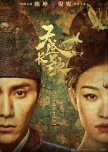
The Rise of Phoenixes
156 personnes ont trouvé cette critique utile
Machiavelli in love.
The first thing that comes up in any discussion of the Rise of the Phoenixes is that it has a bad ending. I put this in cold storage because I didn't want to be punched in the face after 70 episodes. After watching, l can confirm that it does indeed have the worst ending ever: 5 bad minutes that make little sense. The rest of it is so engaging that I loved almost every moment, plot flaws and all. It is one of my top 3 dramas. There is a spoiler discussion of the ending at the bottom if you scroll down.This was adapted from a popular novel (which I did not read) that had tragic elements but did not end in tragedy. Most of the flaws can be traced back to a fatal decision to change the book ending. That resulted in plot inconsistencies and several main characters making odd and uncharacteristic decisions in order to force this outcome. This begins from about episode 50. The last arc (~10 episodes) are the least convincing and closes the drama at its weakest moments. There are excellent reviews here that analyze the plot holes and flaws with this drama so I won't deep dive any of that. I will focus on what makes this hidden gem irresistible and unforgettable in spite of the negatives.
This is a political drama about the ascent of Ning Yi, the 6th prince of Tiansheng. Raised amidst palace intrigue, betrayal and murder, Ning Yi is a somewhat dark character who is an ultimate survivor. He is the quintessential Machiavelli; a ruthless manipulator and a consummate Go player both literally and figuratively. Wrongfully banished for eight years, he claws his way back to favor, methodically eviscerating his scheming brothers along the way. Initially his purpose is uncover the mystery behind his mother's disappearance and avenge his third brother's deposal. As he gains power, the goal posts change as he aspires to unite the kingdom and make it a place where all are equal in the eyes of the law. Like all characters destined for political greatness, Ning Yi believes that the ends justify the means and ruthlessly and deftly eliminates anyone in his way. He is a guarded character that conceals his true self behind a mockingly care-free and cynical façade. Shards of radiant light emerges when his core convictions are tested and when the people he cares for are threatened. Chen Kun's deliciously portrayed Ning Yi is brilliant, dramatic, wicked, ferocious, daring, charismatic, mischievous, sentimental and utterly unforgettable. I could not get enough of his wandering eyebrow, the wicked gleam in his eyes, his vehemence and his diabolical sense of humor. Ning Yi is an endlessly fascinating, one of a kind character that is by far my all-time favorite c-drama protagonist.
Fang Zhiwei for the first ~50 episodes is the rare strong female lead character we don't see enough of. She is the lowly niece of a powerful minister that is raised in his household on sufferance. She is highly educated, clever, idealistic and audacious enough to take charge of her own destiny. She encounters Ning Yi for the first time in a bold attempt to foil her uncle's plot to marry her off to this powerless prince in her cousin's place. He is intrigued by her and recognizes her resourcefulness could be useful to him. But she has a mind of her own and does not fall in with his plans that easily; as often as not they end up on different (though not necessarily opposing) sides. With Ning Yi's help, she disguises herself as a male scholar Weizhi and enrolls in the most prestigious school in the capital. She gains recognition as the Ultimate Scholar and becomes an influential member of the court and trusted confidante of the emperor. I love strong female characters like this and Ni Ni really shines in this role, especially when she goes toe to toe with Ning Yi. She is as persuasive as the boyish, accomplished and cunning Weizhi as she is the exquisite, vulnerable and overly idealistic Zhiwei. Zhiwei/Weizhi is a consistently awesome character until she sheds her identity as Weizhi and becomes Zhiwei again. At that point, in all the moments that matter she loses her common sense and regresses into a naïve, overly emotional and easily manipulated Zhiwei who no longer knows what she wants. Unfortunately this remarkable character was thrown under the bus to facilitate the dreadful ending.
Ning Yi and Fang Zhiwei were just made for each other. Only actors of Chen Kun and Ni Ni's caliber can express intense passion and longing while barely touching and the wordless communication of two soul mates who just know each other. All of their interactions are mesmerizing - their spirited and witty banter, the way Ning Yi chokes with unholy mirth every time he teases her and of course the biting scenes that I couldn't stop re-watching. Every time they part ways, I am devastated by how dejected Ning Yi is; how their body language conveys the true feeling behind the false bravado of their words. Ning Yi is proud of, not threatened by Zhiwei's abilities and independence, even when she challenges him. Thus Zhiwei bails out Ning Yi as often as he saves her. They are the ultimate power couple, a force to be reckoned with when they are united against some rather formidable villains. By no means invincible, they suffer crushing personal losses and setbacks that among other things forces Ning Yi to make the hardest sacrifice to keep Zhiwei safe.
The romance is so consuming it sucks you into rooting for them through many obstacles; blithely ignoring the blatant warnings throughout that it doesn't end well. This overshadows the fact that this drama is actually about political strife both internal and external. Together our main protagonists deal with internal conspiracies, ambitious princes and politicians, rebellious fiefdoms, remnants of the former kingdom, encroaching neighbors and a devious and paranoid emperor. The emperor is a distant father with too many sons that he treats as little more than pawns and potential usurpers. He is the one person that Ning Yi cannot protect Zhiwei from once her origins are revealed. Their worst enemy however is misplaced fiduciary to an older generation that can not let go of the past so that the younger generation can follow their hearts and dreams.
While the plot is complex with multi-faceted main characters, the overall narrative is clear, well paced and easy to follow. Despite some messy transitions and plot holes (likely due to censorship), the meaning and general thrust of the storyline is intact. The dialogue is witty and sprinkled with light humor that balances politically heavy tone of the drama. The characters are colorful and many have lovable quirks: Nanyi's odd eating habits, Ning Sheng's priceless facial expressions and Helian Zhang's parody of a lovesick fool. Both main protagonists have meaningful and independent relationships with the other core characters; they are not just defined by each other. Ning Yi's key friend, ally and confidante is headmaster Xin Zhiyan, an ambitious and wily strategist. He is protected by the fiercely loyal Ning Cheng, who is the couple's greatest champion. Zhiwei is aided by the dependable Yan Huaishi and protected by the devoted and silently lethal Gu Nanyi. The characters are well written, with their own priorities and agendas and have free will. Ning Yi and Zhiwei's relationship and their actions create uncertainly and friction in some of these surrounding relationships that sets in motion a number of unexpected and exciting plot twists with some heartbreaking consequences.
Though the last ten episodes are the weakest with pathetic and unconvincing villains, I still wanted to see the last main villain go down. Although I was warned, I won't lie: the last 5 minutes were still despicable and unforgivable. It was also completely out of character for Fang Zhiwei and thus not convincing. It was so bad I didn't even feel sad, I just kept shaking my fist at the TV. That said, this drama must be judged in its entirety and remains emphatically one where the journey is much more important than the destination. What a thrilling and riveting journey! I started to re-watch it almost immediately, something I haven't done since TMOPB. I really want to give this a 10 because I love it so much I just don't care about the flaws. But I knocked off 0.5 anyway as my petty and impotent vengeance for the ending.
On re-watch I realized that the ending can be interpreted as open which I discuss below (MAJOR SPOILER).
Warning: Major Ending Spoiler
In Zhiwei's last conversation with Nanyi at their base in the capital, he reiterates that he goes where she goes. He asks her if she is really going to marry Ning Yi and be his empress. She asks if that would be such a terrible thing? We may not have been shown the whole conversation which ends with Nanyi saying that he will wait there for her, implying she is coming back (and not marrying Ning Yi). The ending jump scene had a very surreal quality to it, almost as if it were a dream and not real. It can be argued that she fakes her death and disappears with Nanyi. This would be much more in character for Zhiwei. It would also be closer to the book ending which has her faking her death and eventually reuniting with Ning Yi who gives up the throne for her (credit to @Skibbies who shared the book ending with me). I think most viewers (including myself) were so shocked and dismayed they missed this subtlety. Though less obvious, it is the ending interpretation I prefer. I understand why Zhiwei wouldn't want to be empress when their path to the throne is littered with bodies but she is also smart enough to know that their cause was never her cause and that would be too unfair to Ning Yi. Ning Yi and Zhiwei have done enough for king and country and deserve a chance to enjoy their uncommon love as common people.
Cet avis était-il utile?
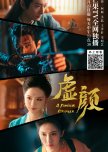
Face off.
While looking for her long lost sister, Shi Qi is overpowered by the scheming Prime Minister's daughter Shen Qin. When she wakes up, she discovers that a magician used dark magic to swap her face with that of Shen Qin. She finds herself married to General Xiao Hansheng in Shen Qin's place. Shen Qin assumes Shi Qi's identity and returns to the side of her lover the ambitious and ruthless Prince Ning. Shi Qi is unable to expose Shen Qin to either man as her sister is held hostage by Shen Qin. The plot tightly weaves together lurid affairs, murder and intrigue, treason and breathtaking, titillating romance. The suspenseful tension climaxes in a satisfying face off between the two women with a gobsmacking twist. Best to steer well clear of spoilers for this one.While the chemistry between the lead couple sizzles with passionate intensity, there is a quiet authenticity in how their relationship blossoms. The powerful hook of this romance is the simple convincingly articulated idea that Shi Qi has a unique identity that transcends her physical appearance and her true soulmate can sense her soul, the core of who she is. This is at sharp contrast with Prince Ning who lacks insight and does not have the same connection with his lover. That said, the second couple's dark chemistry is also alluring enough to make me root for them. While the story is quite dark, the dialogue is infused with wit and humour. The rapport and banter between the general and his much aggrieved military advisor hilariously and effectively captures the evolution of the general's feelings.
There is little to find fault with in the crisp, intriguing plot and the heartfelt performances by the young cast. Indeed these gorgeous young actors can give lessons to their more established peers on how kiss scenes should really be done and how not to sleepwalk through a drama. Is it a masterpiece? Nope but it is addictive enough for me to rate it an 8.0.
Bottom line - this is a total find of a delectably sexy and suspenseful romantic short-length drama that you must start watching now. Just do it. And thank @Noel for this stupendously good recommendation.
Cet avis était-il utile?

Bian Liang Meng Hua Tu
111 personnes ont trouvé cette critique utile
Love is a many splendored thing.
A Dream of Splendor has rocked the staid, tired, cliché infested Chinese period drama world. It is an alluring adult romance that has set the internet on fire. It is a powerful and exhilarating story about downtrodden women who work together to stand up against feudal society. Written and directed by women, it is a story about how women survive, thrive, bond and love. The production values are astonishing, with meticulous attention to detail and appreciation for history and culture.This story is about the plight of fallen women or jian ji 贱籍 during Northern Song Dynasty. Jian ji are pariahs or outcasts; people who exist outside of the four social classes of scholars, farmers, workers and merchants and are practically slaves, beggars, prostitutes, actors, musicians or fallen people below commoner status. This status is passed from generation to generation and cannot be easily changed and the women are not considered suitable for marriage into gentry other than as concubines. Promising beauties like Zhao Pan'er and Song Yinzhang are trained from a young age in the fine arts and performance to potentially become renown entertainers to the imperial court. Too often, like Zhang Haohao they become courtesans who flourish at the most elite levels of society and are almost indistinguishable from upper class women. Many hope to marry their patrons and leave this existence behind them. This explains both Pan'er and Yinzhang's insecurities and their strong desire to shed the taint of the jian ji 贱籍 status.
The drama was mocked for its preoccupation with chastity which does not fit in with the societal norms of the day. In Guan Hanqing's famous original zaju 杂剧 or Yuan opera 赵盼儿风月救风尘 (Zhao Pan'er Flirts to Save A Harlot), both Panér and Yinzhang are courtesans. Guan Hanqing's works are known for championing the oppressed and courtesans were historically viewed sympathetically. The grace, beauty and education of legendary courtesans is often celebrated in Chinese vernacular literature. The production decided however, that Chinese audiences would not be receptive to a Song dynasty version of Pretty Woman. While some may feel this does not respect the original works, it is not important. The drama adaptation in its entirety is far from prudish and remains faithful to the spirit of the play in its criticism of the hypocrisy of traditional morality. That is all that really matters.
After crushing personal setbacks, Zhao Pan'er, Sun Sanniang and Song Yinzhang make a fresh start in the capital Kaifeng. They are bonded by the hardships they endure due to their low social status. They are realistic characters with flaws aplenty who make mistakes with consequences. They don't always agree and when they fight, they can be woman style mean to each other. Pan'er is a talented performer and a connoisseur of tea, tea art and famous paintings. Despite her serene demeanor, she has her own insecurities but is determined to leave her painful past to become an independent and capable business woman. She won't be bullied, is vengeful and does not hesitate to seek legal redress for injustices.
Pan'er is overprotective of the immature and temperamental Yinzhang, a rare and talented pipa player whose ability is only exceeded by her arrogance and desperation to escape her low status. Together with the feisty and loyal Sanniang, a fantastic cook and pastry chef, the three friends start a teahouse with their pooled resources and combined abilities. On the way to Kaifeng, Pan'er clashes with the Living Devil Gu Qianfan, commander of the powerful and secretive Capital Security Office and all kinds of sparks fly. Liu Yifei and Chen Xiao are the stars of the show with their thrilling, combustive chemistry and screen presence. Both actors have matured considerably and it is fair to say Zhao Pan'er and Gu Qianfan are their best roles to date respectively. Even though Yinzhang is the character that shows the most growth, Lin Yun's portrayal lacks complexity and is not empathetic. It is the weakest link among the main cast. Liu Yan's Sanniang saves the day as the best friend everyone needs with her wonderful mixture of comedic belligerence, endurance and wisdom.
This drama's greatest attraction and also its greatest drawback is the incomparable romance between Zhao Panér and Gu Qianfan. The fervent, ardent chemistry between Liu Yifei and Chen Xiao has me grinning like a giddy, lovesick fool every time they light up the screen. I love how Chen Xiao communicates passion with heat in his eyes and how his expression can suddenly turn from guarded to vulnerable to hopelessly smitten. I leapt up from my sofa and yelled "liar, LIAR" at him in the very first episode when Gu Qianfan claimed not to find Panér beautiful even as his eyes oozed with pure male appreciation. Liu Yifei's Panér is such an exquisite and feminine foil for his masculinity that it is just entrancing to watch their courtship as it evolves subtly from friction to unwelcome attraction as she slowly beguiles him with her grace, independence and soft-spoken sincerity. Yang Yang is a phenomenal director whose gorgeous and intimate camera angles enhances the thrill of their budding romance and build up in passion to the point there are moments I feel like I am invading their privacy. The drawback of course is that the story is much bigger than the love story which is too engrossing and spectacular. All the other plot threads pale in comparison.
At the point I am in serious danger of diabetes from the sugar highs, Pan'er's and Qianfan's romance gets put on ice for a number of episodes for a flimsily crafted misunderstanding. I am less dismayed than most by it, because I like to see a relationship tested for duration by challenges. While their conflict could be better conceived, the writer has fewer degrees of freedom to work with because the plot is embedded within true events and historical figures of the day. This won the praise of many history buffs who got a huge kick out of deciphering who's who and which events, as was analyzed in detail by other viewers such as @CloudA. Panér's heartbroken but enlightened insight that her father fully knew well the consequences of his actions but chose to do so anyway is a resonating fresh twist out of a tired trope. Despite their hiccup, the couple remains honest with each other about their fears and have realistic expectations that it may not be smooth sailing all the way. Du Changfeng and Sanniang's story is charming and heart warming while Chen Lian and Zhaodi's is more youthful and high spirited. I have high hopes that both Yinzhang and Chi Pan will find happiness down the road.
The digression from the main romance plot makes way for the women's story to be properly told, for their bond to mature and for them rescue each other and themselves; to be mistresses of their own destiny. The debut of their fabulous Yong'an Restaurant showcases their combined business sense, artistry and ability to innovate and is for me is the highlight of the drama. Pan'er's riveting tea art performance at the beginning is eclipsed by the extravagant and absolutely decadent dinner performance where famous paintings came vividly to life. I love how spectacularly it involves most of the supporting cast. Both the cheeky He Si and Chi Pan made me laugh and the women looked stunning. It is analogous to how this production breathes life into the famous historical works of art and literature that inspired this story.
For me, the comedy mostly misses the mark. I find Guan Yunping's (Chen Lian) more subtly hilarious brand of humor more appealing than Dai Xu's (Chi Pan) more slapstick and exaggerated approach. The actor tones it down nicely in the second half and manages make me laugh and impresses me with his acting but unfortunately that is where the plot loses momentum. This is somewhat forgivable since it is more of a character story but nonetheless they should have kept things simpler. The political aspects of the conspiracy to disgrace the empress becomes overly convoluted and leaves loose threads. Even though Ouyang Xu's final confrontation with Pan'er is well acted and satisfying, he becomes the embodiment of too many bad men and love to hate stereotypes. The interpretation of Empress Liu-E, a brilliant and powerful historical figure as a woman pushed to try to conceal her humble origins is fascinating and aligns well with the dramas feminist theme. It is well known the Emperor was aware of her background and did not care. Theirs was surely another splendid love story for the ages.
Pan'er and Qianfan's addictive chemistry and their story convinces that love is a many splendored thing. They are certainly bound for the Drama Couple Hall of Fame. Despite the disappointment in plot, which is at best worth an 8.5, I am compelled to rate this a 9.0 for the romance and for getting the important things right including the empowering themes, the originality and the director's magnificent and distinctive visual composition style.
Cet avis était-il utile?

Une vieille chanson d'amour
89 personnes ont trouvé cette critique utile
A timeless love story with no beginning and no end.
An Ancient Love Song is a beautiful, haunting and timeless love story with no beginning and no end. The fresh storytelling approach fits Graham Greene's description of a story as something one arbitrarily chooses that moment of experience from which to look back or from which to look ahead.Shen Buyan is a professor and popular chronicler of the life of the wicked demon queen of Nancheng that lived thousands of years ago. She is reviled by history for killing a virtuous prime minister and living an extravagant life. Shen Buyan comes into possession of a mysterious jade artefact under an ancient wishing tree that sends him back in time. He discovers that all is not what he expected it to be. He meets the badass Lu Yuan and she moves him so much he wants to change her life and tries desperately to put a stop to a treasonous plot. The story told from Shen Buyan's perspective is in reverse chronological order. Each time he travels to the past, he goes back further in time. Thus the first time he meets Lu Yuan is when she loves him most. And the first time Lu Yuan meets Shen Buyan is when he loves her most.
The plot design is innovative and invites multiple rewatches. The first time I watched it in the order the production intended but you can really start anywhere as the story is a continuum that can be started at any point and can be watched forwards and backwards. Shen Buyan and Lu Yuan are star crossed lovers 有缘无分 destined to meet across time and space but not fated to be together. But because it is a love story that has no beginning in many ways it also does not end. Their enchanted love affair spans thousands of years. Surely that has to be enough.
I cannot praise enough this impressive low budget production that punches above its weight and originates from a fan made video. It is clearly a passion project that the entire cast and production team put a lot of heart into and it shows. It is anchored by the spectacular Zhang Yaqin from Love in Between. She is gorgeous and baddass here too and effortlessly and convincingly transforms from the 36 to the 18 year old Lu Yuan. Shen Buyan is played by Guo Jianan, a bit of a cute newbie actor that takes awhile to get into character but he gets pretty good by the end. The young cast overall delivers charismatic and empathetic performances. The villain role is especialy well done by a young actor with great screen presence and gravitas.
This is a must watch drama that I enthusiastically rate 8.5/10 overall with a story by itself that is worthy of at least 9.0.
PS - Be sure to catch the special, told from the FL's point of view.
https://www.youtube.com/watch?v=rYPDTcUwJqQ&t=71s
Cet avis était-il utile?

One Inch of Yearning
71 personnes ont trouvé cette critique utile
The One True King.
This drama packs a powerful punch from the very first episode with frighteningly intense fight scenes that had me flinching at every viciously lethal sword stroke throughout. The dark and intriguing wuxia plot is like an addictive, multi-dimensional jigsaw puzzle that brilliantly seduces with a mysterious backstory and shadowy motives of the key actors. This is a very intelligently written drama that will appeal to engaged viewers who enjoy pulling at threads until all is revealed.Be warned - there may be mild spoilers ahead although I will steer clear of major spoilers.
Wen Siyuan, the suzerain of the information broker Shanshui sect is tasked by a gifted itinerant doctor Zuo Qingci to help recover a stolen defense map that was entrusted to marquis Yan. They enlist master thief Su Yunluo/Fei Kouer and the two top disciples of the powerful Zhengyang sect (Yin Changge and Chen Manqing) to aid them in this dangerous quest. It turns out to be a bonding adventure for them that results in a friendship and trust that can prevail over existing loyalties and conflicting agendas. It also drags them into a battle for the throne and reveals secrets relating to a decade old conspiracy involving their elders.
From the start, that GOT callousness of characters dying at the roll of a dice probably made me protect my heart from caring too much about any of the main characters or couples. My favorite characters are the more peripheral ones - the Ghost Boy and the One True King. All of the characters in this drama are flawed and make mistakes. While Qingci and Yunluo are clearly the leads, there are many important, well developed and well acted roles. Our leads are both single minded to the point of obsession in their goals; Yunluo in a decade long quest to heal her shifu and Qingci initially with Yunluo and later on, with revenge. While I did not enjoy the obligatory angst, the overall progression of this relationship from an unhealthy adolescent infatuation to a mature and sustainable one was well done. Both young actors are charismatic and convincing but it is Zhou Tingwei's enigmatic Wen Siyuan that steals my heart and anchors the entire cast. Romance is not this drama's strongest point but the one between Siyuan and Manqing is sophisticated, witty and laced with just the right amount of spice to make the sparks really fly. The women are strong and independent and have their own agendas that can be higher priorities than love so they don't just meekly fall in with their men's plans. Best of all, they don't bore me with any high pitched squealing. The bro-mance between Changge and Zhuyuan is also very enjoyable although I don't love where the the story goes for both characters.
The real hook of this largely plot driven drama besides the satisfyingly bloodthirsty action is discovering hidden identities, motives and secrets, understanding Qingci's ruthless strategies and his end game and how he adapts when things don't go completely to plan. Which happens A LOT. Because the villains are just that cunning and that much more powerful that sometimes they win. The way tension and suspense is built in this drama is really masterful but can induce stress. The story is brilliantly written but unfortunately flaws and plot holes emerge towards the end. The first arc is really exceptional on all fronts but the excitement and ruthless brutality peaks there although the story continues to be absolutely riveting. From ~ episode 30, the story succumbs to crowd pleasing but unnecessary romantic tropes, some gratuitous deaths and imminent tragedies. While it builds to another climax the ending was only just satisfactory and did not meet my admittedly high expectations. There were too many holes and they unnecessarily wrote themselves into a certain outcome that they did not dare to follow through on with the same characteristic cruelty of the earlier arcs. I am left wondering if their quest was ultimately futile and if the high cost of revenge can be considered justice. To me, the true unsung hero of this story is the One True King who is willing to sacrifice for peace but is not king in name. This is the character that moved me the most. Does the legend of such a noble king make this a very dark wuxia or one that is bathed in bright light?
This is the most awesome wuxia of 2020, flaws and all. I initially considered it a 9.0 due to my high personal enjoyment but objectively 8.5 is more than fair given the messy ending.
Cet avis était-il utile?

Horror Stories of Tang Dynasty
83 personnes ont trouvé cette critique utile
The Making of a Di-tective
Strange Tales of Tang Dynasty is 2022's surprise hit and a must watch for mystery wuxia buffs. Inspired by zhiguai xiaoshuo 志怪小说, this is a collection of slightly supernatural mysteries set in Tang dynasty. This form of folk literature was very popular during that period and is not limited to ghost stories but also strange or anomalous phenomena. Fifteen centuries later, these fantastical tales continues to set imaginations afire and is a well explored genre in contemporary media. Well before Tsui Hark's wildly entertaining and successful movies from 2010 onwards, Detective Dee was already by far the most ubiquitous protagonist of this genre.The Tang Code is one of Tang dynasty's great accomplishments and was the model for all future dynasty's legal codes in China and East Asia. Di Renjie was a Tang judge renown for numerous fair and impartial judgements and one of the heroes of ancient China. He twice ascended to rank of chancellor during Wu Tzetian's reign. The popularity of zhiguai xiaoshuo and this rich historical backdrop makes this period rich fodder for fantastical Di Renjie inspired ancient detective stories like this. This is set during Wu Tzetian's son Ruizong's second reign. Ruizong was a pretty useless emperor and his sister Princess Taiping was the real power behind the throne. Harboring ambitions to be another Wu Tzetian, Princess Taiping was engaged in a power struggle with crown prince Li Longji (Xuanzong). In terms of recent Tang dramas, this takes place after Luoyang and before Longest Day in Changan and The Imperial Coroner. This drama is well researched, largely respects history and is true to the societal, institutional and legal norms of the day.
The county sheriff of Chang'an, the capital city is found dead under spooky circumstances. Su Wuming, a disciple of the revered Di Renjie is summoned hastily to Changan to assume this position. His path keeps crossing with that of Lu Lingfeng, a proud and ambitious young general of the jinyiwei or imperial guards. Their relationship starts off as adversarial as Lu Lingfeng clearly resents that Di Renjie once rejected him as a disciple While not his match in rank, resources or martial arts, the crafty Su Wuming runs circles around Lu Lingfeng and manipulates him (and his resources) into aiding in his investigation. As they race to unravel their entangled cases they encounter sorcery, shape shifters and battle adversaries with unworldly powers. Inevitably a grudging mutual respect and comradeship forms between the men. While Su Wuming is clearly the master detective, Lu Lingfeng is also smart and has great instincts but is foiled by his quick rush to conclusion and lack of experience. This is not another cliched and static brains vs brawn investigative combo where the brains (Holmes, Poirot) is elevated by how dumb and naïve their sidekicks are (Watson, Hastings). This is just as much Lu Lingfeng's story as it is Su Wuming's. Under Su Wuming's discreet tutelage and hilarious machinations that fall barely short of hazing, we see the makings of a Di-tective out of Lu Lingfeng.
Lu Lingfeng''s overweening pride and arrogance would come off as off-putting if it were less charismatically portrayed by Yang Xuwen with the subtlest sense of self-awareness and irony. Although the Tang rulers made imperial exams a mandatory prerequisite, scions of noble families such as Lu Lingfeng's were able to secure coveted positions and advance on the fast track as a result of patronage. This explains why at such a young age he was a fourth rank general in the elite imperial guard. I think most don't appreciate how ignominious it is for Lu Lingfeng to accept a subordinate position to a county level official such as Su Wuming. He rolls with the punches and learns from his mistakes to discover a greater sense of accomplishment by earning his way back to the top. After a long hiatus, it is good to see Yang Xuwen come back with such a multi-faceted, well interpreted character that is arrogant and quick tempered on the outside but pragmatic and even mushy on the inside. He has amazing rapport with veteran actor Yang Zhigang who delivers a flawless depiction of the astute, seasoned detective with keen survival instincts and a slightly diabolical sense of humor.
While Su Wuming is the maestro that pulls all the threads together, the cases are tackled by a motley team of talented and engaging characters they pick up along the way. Master Fei Ji is the extraordinary doctor who sells his soul for a chicken a day, Pei Xijun is insightful beyond her invaluable photographic eye for detail while Xue Huan and Ying Tao round out the formidable martial arts team. They are all lost souls who become found family and find meaning in their work together. It is rare to see such excellent character development in this genre, which tends to be more plot heavy. The team dynamics and witty repartee is one of the most enjoyable aspects of this story. There are two romances that don't take center stage but are quite charming although the second one in particular is not necessary. This is a wonderful ensemble cast that put a lot of heart into their performances. While some of the acting lacks finesse, it is yards better than all the boring posing by overpaid and entitled idol actors that the industry keeps cramming down our throats. It is clear from the production values, the well choreographed action scenes and the CGI that the budget was spent on all the right things.
This intriguing and engaging collection of strange cases from the Tang dynasty hooked me from the start. In a year where too many high profile Chinese dramas have started strong only to fall down on plot, this drama delivers into the final mystery. There are eight cases that wander down an intriguing path of murder, mayhem and all kinds of odd happenings that pay homage to real records of such occurrences from that period. The cases are well written and littered with clues that will allow the attentive viewer to participate in the solution. The supernatural elements end up mostly but not entirely debunked, leaving a nice eerie aftertaste. To me the most frightening case is the one involving the scholar Dugu Xia (shout out to the most underrated actor Han Chengyu), where true evil is not some supernatural phenomenon but resides within man's nature. The drama finishes strongly with an excellent cold case, one that evaded Su Wuming's mentor Di Renjie. If I have one complaint, I would have liked to see the whole team crack the final case together. Instead they traded in two favorite characters for two that are introduce late in the game. I also didn't like that Su Wuming and Lu Lingfeng pursued separate leads for most of the final case although I understand that is to show Lu Lingfeng has come into his own.
I expected this low profile drama to be one of a long string of forgettable Detective Dee wanna-be dramas that is just good to pass some time. I am still rather befuddled at how enjoyable it is. It is on par with, if not slightly better than Ancient Detective, 2020's sleeper mystery wuxia hit, which I also rated 9.0. This has toppled many higher profile dramas to rank #2 on my watch list for 2022.
Cet avis était-il utile?

My favorite trashy romance.
This is the drama version of the perfect trashy romance to curl up in bed with on a rainy day. It is not overly ambitious in terms of plot and will not satisfy hard core fans of the detective genre but overall it is an unpretentious hidden gem that will bring you on a delightful romantic journey.Our titular character Su Ci is a brilliant young investigator with a hidden identity as the daughter of a traitor. Her reason for existence is to unravel the conspiracy that led to her family's downfall and murder. In the middle of a case, she runs into Prince Qi who is traveling incognito. He is also trying uncover the traitor behind his army's crushing defeat and his consequent demotion. They fall like a ton of bricks for each other well before they figure out each other's hidden identities. They form a fast friendship with another couple they meet on their first case and team up to solve a number of cases that lead to the ultimate unraveling of a bigger political conspiracy and redress old injustices.
The main issue with this drama is aside from some really steamy romantic scenes, the various plot threads lack intensity. The main characters only superficially interact with the characters in the cases and the investigations seem to largely involve the four friends solving the case by talking to each other. As a result there is no build up of suspense and excitement in the gradual reveal of the cases. The overarching plot and main antagonist is known from the get go but is still better written than the short cases and at least there is a small twist at the end. Oh you didn't notice? Yups... that's what I mean... The main villain is well acted and it is a shame they left the only heavy face to face clash between him and our leads until the end. The whole point of revealing the villain early in the game is to let them face off a few times.
So why watch this? Because it is a lot of fun and even though it shows that it is a young cast, there is great rapport between them and both romances are very good. The OTP have boatloads of chemistry, they look gorgeous and fitting together and deliver many squeal-worthy moments - I mean who cares that it makes no sense that they retreat into a cave after an ambush when help is just around the corner? You have to embrace drama logic - they go to the cave because they can wow us with more hot kisses there, don't worry about whether it is safer to reunite with their friends and guards instead. They are written to be smart characters and they generally are when they are outmaneuvering their enemies or busting criminals. But there are also many times when heavy suspension of disbelief is required.
Newcomer Zhang Linghe really impresses in his debut performance here as Prince Qi and my sense is he is an actor to watch. The main relationship is (outside of one short lapse) very well written - mature, mutually supportive and I just love how Prince Qi is very amorous he does not hesitate to pounce on Su Qi at any opportunity.
I really enjoyed this drama and if I were to rate it on fun factor and romance alone it would be a 9.0 for me but all things considered, I think an 8.0 is appropriate.
Cet avis était-il utile?

Fifty shades of cliche.
This drama is a dark, melodramatic blast from the past. It is fifty shades of the worst outdated bodice ripper romance cliches imaginable. Dong Tingyao is the sole survivor of her family's massacre. She suspects warlord Fang Tianyi to be the culprit and finds herself a maid in his household. The villain is obvious from the beginning but sadly our voluptuous heroine has more guts than brains and finds herself in one dicey situation after another. Fang Tianyi is the kind of alpha male hero that struts around flaunting his magnificent chest while he uses very coercive methods to seduce Tingyao. Yes, exactly the kind of story that has all but been eviscerated since the advent of feminism and political correctness decades ago. And yes, I unabashedly sucked up every ridiculous, outrageously hot but ahem,I mean totally unacceptable moment of it!The bottom line is you won't enjoy this drama if you think about it. But the leads sizzling chemistry and Fang Tianyi's hot, searing gaze and the heavy lidded way he eyeballs Tingyao is enough to make me forget to breathe, much less think. Despite the cheesy lines and some iffy costumes, the acting, especially by Dai Gaozheng is mesmerising. The melodramatic plot allowed both actors to demonstrate their ability to convey the gamut of intense emotions - love, hate, forbidden desire, fear, frustration and passion, lots and lots of passion. For the first time I really understand why these kinds of characterisations used to be so hugely popular in the past. It is a strong testament to the actors chemistry and skills that can make me look past all these out of favour tropes. Honestly if anyone in real life tries to pull a Fang Tianyi on me, he'd get a kick in the nuts that causes permanent damage. But as a fantasy guilty pleasure of a short drama (10 minute episodes), I enjoyed this immensely.
The ending was terrible but then so were so, so many other parts. Nonetheless I am peeved about it enough to give it a 7.5 instead of an 8.0. Yes I am petty that way. Still, this is a fantastic way to indulge in the occasional smoking hot guilty pleasure.
Final comment: consider stopping at ep 29 for best viewing experience.
Cet avis était-il utile?

Thin line between love and hate.
In an uncannily similar vein with Maid's Revenge, this mini drama is just a chock full of the worst red flags. So if you are going to be triggered by a toxic alpha male and an intense but abusive love-hate relationship best steer clear of this drama. If however you can suspend moral outrage and present social norms for ~240 minutes then you are in for one helluva hot and wild ride.Plot-wise, Circle of Love must be part of Youku's addictive toxic trilogy which rehashes the dark Republican era Romeo and Juliet revenge trope we saw in both Maid's Revenge and Bride's Revenge. Determined to avenge her family, Gu Meng ambushes her former fiancé, the formidable warlord Xiao Hongye. Her pathetic attack is foiled and she finds herself captured and conscripted as a maid in his household. She conveniently experiences memory loss, allowing herself to fall in love with her nemesis over and over again as he domineeringly uses and abuses her in the most thrilling... ahem..., I mean unacceptable, completely unacceptable ways. What I like about this version is that Gu Meng is smart and she has a plan. She can go toe to toe with Hongye and it is literally tit for tat in terms of these star-crossed lovers' ability to do terrible things to each other. The actors light up the screen with their intense, sensuous chemistry and do an amazing job showing us their gut wrenching internal struggle as they explore the thin line beween love and hate.
I could tell you that I watched this for the tight plot, which is actually well designed and has a nice twist. But that would be a lie. This is all about Li Jiulin's dark, complex and masculine good looks, his amorous smouldering gaze and his taut tanned chest. His steamy portrayal of the controlling, possessive, passionate, cruel and yet oddly vulnerable Hongye had me giggling and cringing at the same time. And the way he manhandles the inflamed and writhing Gu Meng who obviously loves to hate him had me chanting unconvincingly to myself "This is so not ok!!!". If there is any takeaway from this short, dark and titilating tale of love and hate it is that if your enemy is a smoking hot man beast, satiate yourself thoroughly before giving him a few bullets to remember you by. I found the ending a bit mean spirited but ultimately satisfying and appropriate.
This is a classic dark and thrilling bodice ripper romance that comes with all kinds of health warnings over outdated gender norms and inappropriate behavior. This is not the kind of thing to try at home but it can still be enjoyed vicariously with the air con switched on high and a nice glass of wine. Don't judge me for enjoying this enough to rate this 8.0/10.0; the best of the three in my opinion.
Cet avis était-il utile?

A riddle wrapped in mystery inside an enigma.
Ancient Detective is a rare treat for both die hard wuxia and mystery lovers that surpasses expectations for both genres. This drama pulls you in right away and takes you on an thrilling, suspense laden journey to solve a riddle wrapped in mystery inside an enigma.The plot is centered around gifted detective Jian Buzhi's (Yu Jiwei) quest to track down the four remaining witnesses to an epic jianghu takedown of a murderer eight years ago that killed his father. His own lost memory dances on the edge of the riddle of that day's events; he is determined to clear up all the remaining loose threads including the mysterious disappearance of the murderer's corpse. But there are shadowy vested interests that stand in his way including a deadly assassin's guild and a sinister antagonist that always seems to be just one step ahead of him.
There are many colorful archetypal jianghu characters with lethal fight skills that get showcased in this drama's exhiliratingly chareographed kick-ass action scenes that will satisfy any wuxia buff. Jian Buzhi himself has no martial arts ability so all of the fight action is centered around Zhao Wohuan (Wan Yanyang), the second male lead who has an engaging bromance with Jian Buzhi and is his main protector. Wohuan is the more interesting and entertaining character who is just a barrel of laughs. I think they should have made Jian Buzhi less of a "blank" character by giving him some interests or eccentricities instead of just being the blandly cliche super intelligent, righteous and chivalrous protagonist. Even his main love interest, the deadly Zhan Shiqi has the peccadillo of being a shopholic assassin with a flamboyant sense of style. Nonetheless, Jian Buzhi picks up a motley crew of companions with awesome skills who ride along on his mission and the comaraderie between them hit all the right notes.
During his quest, Jian Buzhi stumbles upon three murders and in each case, another piece of the bigger puzzle falls into place in a way that neatly ties everything together in the final reveal. All of the cases are meaty and structured in a classic Agatha Christie "And Then There Were None" setting where the suspects are confined in a remote location and are narrowed down by elimination. While the setting is somewhat repetitive, it is also very effective and all of the cases are unique and intriguing enough in their own right to keep things interesting. What sets this detective drama apart from its peers is that it invites the audience to participate in the cases by dropping many good clues and hints along the way. It is not at all afraid to let the viewer solve the case alongside Jian Buzhi. This hooks the viewer into becoming increasingly invested in the cases and the outcomes. I managed to identify all of the culprits before the end of the cases but not so early on that there was no challenge in it. While I had an early inkling as to the final enigma quite early on, I still groped in the dark for the final piece of the mystery long enough to feel a strong sense of accomplishment when I finally figured it out. The ending twist was still fantastic, thrilling and chilling. I love where they left things with Jian Buzhi - it was both satisfying and thought provoking.
I gobbled up this drama from start to finish. It wasn't perfect but it truly qualifies as a suspenseful and interactive mystery for amateur detectives with a dash of romance, bromance, adventure and action. This is definitely a must watch for anyone that loves a mystery.
Cet avis était-il utile?

Le Bégonia de l'Hiver
109 personnes ont trouvé cette critique utile
I dreamed a dream.
Winter Begonia is the Downtown Abbey of Chinese opera. To simply describe it as a BL romance would not do justice to the magnificent breadth and the depth of this unforgettable story. This drama sweeps you into the world of Peking opera of 1930s, where changing times challenge the way of life and traditions of the opera troupes. The mood of this difficult period of modern Chinese history is vividly captured in gorgeous cinematography with a muted, nostalgic, old world palette and lovingly detailed sets and costumes. The bittersweet stories of the dimensional surrounding characters puts the main relationship in brutal context; regardless of station, few have free will to follow their hearts and dreams. These were times where most life decisions are made under duress as a matter of expedience or survival. It is within this backdrop that a rare and touching affinity develops between a hard nosed business man and a temperamental Peking opera divo "dan".Warning - there may be mild spoilers in the following paragraphs.
Shang Xirui is a newcomer that takes the Peking opera scene by storm with his daring interpretation of classic operas and his ability to immerse himself in his female "dan" (旦) roles. Xirui is the ultimate drama queen - mercurial, fearless, unyielding, unforgiving, relentless, sentimental, kind and loyal - a brilliant wunderkind who is capable of both love and hate in equal fervor. Despite his theatrical genius, he is almost childlike in his simplicity towards human relationships and is not fully up to the task of managing his troupe or navigating the competitive and political headwinds of the time. This intense and multi-faceted character experiences the most growth in this drama and is incandescently portrayed by Yin Zheng. His "dan" breaths life into the Yang Guifei and other legendary beauties of Chinese history and literature in a way that rivals Leslie Cheung's iconic performance in Farewell My Concubine. That said, Chen Renxiang's (Tan Jianci) coy come hither "dan" moment was dazzling and that character's final act surely must have been written as a tribute to the movie. This is a testimony to the talent and diversity of the cast and the characters they portray in this drama.
At surface, Cheng Fengtai couldn't be more different from Shang Xirui. He is a charming, savvy and ruthless entrepreneur with a devil may care attitude towards danger. But underneath that devastating smile, he is the saddest, bravest character in the drama. He is someone who gave up his dreams in the name of duty and familial obligations. His was not a love match but he shares common values with his wife, appreciates her and does his best to be the man of her dreams. This character is almost too perfect - he carries the weight of the world on his shoulders, tries to do the right thing and lives up to what is expected of him - as husband, father, brother, patron, friend and... soul mate. He is swept off his feet by Xirui's genius and overcome with admiration for his single mindedness in following his convictions in the face of criticism, adversity and against daunting odds. Xirui is his muse and their Shui Yin Lou is his rich man's folly where he vicariously reconnects with his long forgotten dreams and aspirations. Only Fengtai can understand and pacify Xirui when he is his most rabid, unreasonable, irascible self. Without taking away from Yin Zheng's virtuoso performance in a technically very difficult role, Huang Xiaoming's Cheng Fengtai was equally powerful and evocative. Theirs is a higher love, a bond that goes beyond words and is much more cerebral than physical. The acting is superb and the chemistry is palpable with both actors conveying emotions beyond words in their actions and the brilliant glitter of unshed tears in their eyes.
The drama itself is well paced and strikes the right balance in mood between heavy and light scenes as well as triumphs and setbacks. It is extremely well written, with many wickedly funny and witty moments and characters that subtly mock the stereotypes of those times. The story is much bigger than the two protagonists and is given weight, definition and substance by colorful surrounding characters with layers of flaws and strengths. Fengtai's wife is an awesome character; a smart and capable woman who is limited by the social strictures and biases of her time. Yet at the end, she is able to surpass the norms of the day and embrace a broader, more generous definition of qin ren (亲人) or family. Fengtai's brother-in-law is just a clownish parody of an entitled dilettante and Xirui's rivals were perhaps a tad ridiculous as villains but they serve their purpose. My favorite couple by far was the bandit and the general - they were so humorous and dangerous at the same time my only regret was we didn't get to see them spawn an army of terrifying bandits in their mountain fortress.
If I had to pick at flaws, the drama had too many melodramatic romantic plot-lets around the low social status of the performers and their forbidden liaisons that cross class lines. In the second half, so many characters were killed off that it became a bit gratuitous notwithstanding the well known brutalities of the Japanese occupation. While not as overtly heartbreaking as the tragedies, the moments of slow burn despair in the first half made a much deeper impression on me.
I will not pretend that watching this made me able to appreciate Chinese opera the way it should be appreciated but at least now I can see the beauty and appeal. When my grandma used to listen to it with a teary faraway look in her eyes, I also wanted to cry because it sounded to me like a cacophony of scalded cats. Without making a documentary of it, this drama delivered some achingly beautiful performances that captures the highlights of some of the best known classic operas and emphasizes its importance as a form of hidden social criticism and expression of the joys and sufferings of the masses. While I can't say I have become a die hard fan, I will never cringe again at the characteristically high pitched, occasionally piercingly sorrowful tunes. Indeed I may even have to confess to (somewhat) enjoying it.
This drama has one of the best endings that remains true to the book and is yet (to me) unambiguous. Fengtai and Xirui are kindred spirits zhi yin (知音) and if like Fengtai you have been listening to Xirui, then you will just know him; thus his choice at that moment in time is clear and requires no further elaboration. The future is still up to serendipity and destiny.
This is a very big and generous story that will pull you in and make you care about the many wonderful people in it and mourn the passage of time and events that have stolen their dreams. It is not perfect and falls just short of a masterpiece but it is by far the best drama I seen so far in 2020.
Cet avis était-il utile?
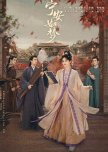
Story of Kunning Palace
203 personnes ont trouvé cette critique utile
May the baddest man win.
This is the drama adaptation of a popular female harem web novel "Kun Ning" (坤宁) by Shi Jing (时镜) with an interesting approach; readers voted on who the female protagonist ends up with. It is a dark and gripping tale of intrigue, conceit, betrayal, revenge and redemption. Jiang Xuening is the alluring but resentful, selfish and ambitious daughter of a court official who ruthlessly parleys her charm and cunning into becoming empress. Her schemes lead to the downfall of the royal family and the ruin of both her childhood sweetheart Yan Lin and the erstwhile incorruptible Zhang Zhe. Desperate and full of regret, she barters her life with the blackbellied Xie Wei to save Zhang Zhe. She finds herself reborn as her 18-year old self with a chance for a do-over. She vows to do better this time, to steer clear of the bastions of power and the malevolent Xie Wei. She tries to use her preternatural knowledge to save Yan Lin and Zhang Zhe from their sad fortune. As she embarks on a journey of atonement, she discovers there is an element of destiny that pulls her towards the center of power. This time, with greater wisdom and insight, she uncovers hidden secrets and unexpected allies that help her better grasp the intrigue unfolding around her. Is that enough to change their destinies or are they doomed to the same tragic fate?This story explores the causal links between the past, the present and the future.; the idea that if only knowing what we know now, we can go back and do what we should have, could have but did not do. It begins with a Ning'er who is already a fully realised character that is not yet revealed; a charming beauty who had the world at her feet and lived a wicked and self-indulgent life. Even though Ning'er's goals change, her innate nature stays the same. The past is told in flashbacks just before the moment plays out again in the present. This works in terms of the more detailed plot points but dilutes the character and relationship stories. Thus while Bai Lu pulls off her role well overall, the piecemeal telling of the backstory doesn't capture the depth of Ning'er's regret or the layers in her relationships with some of the main characters.
Where the storytelling falls short is in Zhang Zhe's arc. To me, it is the most pivotal love story in the drama. He was the best of men, a morally upright official who betrayed his principles for her. And she was a selfish person who was so moved she became selfless for him. Their emotions were so powerful it pushed them both outside of themselves towards a mutually destructive outcome. Sadly unlike the novel, their do-over relationship is shallow and barely scratches the surface of the unfinished affinity between them. It's a pity that instead sticking to the novel which better fleshes out this arc they wasted a bunch of time on the nasty Consort Shu's boring and tropey petty antics. Wang Xingyue delivers such an empathetic portrayal of Zhang Zhe that I was disappointed his character was short changed by the narrative.
As for Xie Wei, I have a weakness for unapologetic, unspeakably damaged, vengeful and morally ambiguous characters like this. Zhang Linghe delivers an intense portrayal of this dark and complex role. Although he overdoes some of the snarls and sneers, his performance overall deserves praise and is his strongest to date. Every time the full fury of Xie Wei's fiery death glare flashes across the screen, I go weak at the knees and my brain turns to mush. Yups, I am definitely a "may the baddest man win" kind of girl. Xie Wei is far from the best man but they are well matched, morally flexible ends justify means kind of people. Their romance arc only takes off later on but it is worth the wait. A mutual understanding develops gradually between them before things get really hot and steamy. When it does, their audacious chemistry explodes in a way that sets a new bar for passionate kiss scenes going forward.
Even though the political conspiracy is not that complicated, it is well told and riveting. Xie Wei's origins are a bit too obvious early on but I enjoyed how Ning'er and Xie Wei work together to uncover the conspiracy. They are both diabolical in how they manipulate the different factions around like chess pieces. The villains are no pushovers but they are overshadowed by the force of nature that is Xie Wei and Ningér's combined dark ruthlessness. This is not an action heavy drama but all of the fight scenes were well shot. I particularly enjoyed the vicious ferocity and absolute glee with which Yan Lin cuts through a melee. I hope this fight maniac Zhou Junwei's small indiscretion does not stand in the way of future roles in action intensive wuxias. Outside of one unnecessary and infuriatingly gratuitous death, the drama ends on a strong note after a bloody, intense and thrilling showdown.
While I enjoyed this drama immensely, the storytelling left me vaguely dissatisfied; as if I only watched the cliff note version of a story that had a lot more depth, nuance and substance than the drama managed to convey. This director is not great at knowing which plot arcs to give more weight to and has an unfortunate predilection for over-bright spot lights and spinning cameras. The production values are mediocre at best. This is a story that had so much potential it deserved to be in the hands of a better director and a better budget. I still rate this a highly reccomended 8.5/10.0.
Cet avis était-il utile?
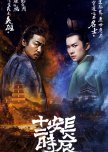
Le Jour le plus long à Chang'an
82 personnes ont trouvé cette critique utile
A highbrow production with broad appeal.
The Longest Day in Chang'an is an immersive, visually stunning, culturally authentic and thrilling journey back over 1000 years in time to Lantern Festival in Chang'an at the peak of the Tang Dynasty. This is a highbrow and very demanding drama that is immensely enjoyable even if taken simply at face value. The viewer gets to decide how much they wish to invest in it. The production basks in rich historical and cultural detail that marvels over the intellectual, political, legal, administrative, military, cultural and scientific sophistication of Chang'an and the Tang Dynasty more broadly. The faithfulness to historical accuracy and strong edu-drama aspect to this show has history buffs raving with ecstasy. As a layman, the finer nuances would be lost on me were it not for the many knowledgeable insights on this and other sites. That doesn't appeal to everyone and some have remarked on the frequent historical and cultural digressions that interrupt the story-line. My simple take is that "smart fillers" are better than the nonsensical fillers that other dramas spam us with.The absolutely stunning cinematography is the first and most consistent impression throughout - every frame is beautifully angled to create a visual, vibrant feast for the eyes. Even flames from explosions burst in an artistic pattern of controlled natural assymetry. The production is not shy about indulging in artistic license and is littered with lithe and gorgeously willowy Tang ladies with only one small section acknowledging more ingrained images of the classical, prosperously rotund Tang lady. A number of Chinese manhua worthy characters are almost casually dropped in among the otherwise characteristically Tang dynasty cast including Djimon Hounson's Gao Le, the menacing African slave-trader and lord of Changán's underworld; a deadly female assassin who is fanatically devoted to her radical master; and a wildly improbable Western Persian Prince priest with impressive kung fu and building leaping skills. At the end of the day, this is very much a work of fiction and suspension of disbelief will be required as the lead characters achieve superhuman physical feats and survive certain death. All of which make for gripping, visually compelling and heart stopping action scenes.
The drama is not an easy, light watch. The first season (24 episodes) opens with the intense urgency of a fast moving, action packed thriller as the two leads Zhang Xiaojing (Lei Jia Yun) and Li Bi's (Jackson Yi) race against time to foil a terrorist plot during the Lantern Festival. The constraint of the 24 hour timeline forces the narrative to alternate between the high speed chase, political machinations around a power struggle and flashbacks that set up the backstory; all threads which converge in the unraveling of the conspiracy. The many plot twists interact with an extensive cast of complex characters from various factions with unclear and/or malleable loyalties in the power struggle between Li Bi's patron the Crown Prince and his powerful rival the Right Chancellor. In short, there is already a lot to take in so the occasional non sequitur cultural or historical digression can come off as one thing too many.
It took me a long time to care for any of the main characters in this show. Even relatively "good" characters are flawed, primarily driven by self interests and had questionable loyalties and morals. It wasn't obvious that Li Bi' s cause, the Crown Prince was more worthy than the Right Chancellor. Zhao Xiaojing's dealings with Gao Le alienated me; especially when it appeared his real motive was to protect the reckless and misguided Wen Ran. That episode and short lived character stayed with me for a long time because it is the first of many times that bad things happen to good people. And that is how good people can end up doing bad things. Thus there are no outright good or bad characters in this show, they are all products of events beyond their control. Time and again the drama explores how circumstances can push any character to act against his innate nature and self interest. It is a very realistic portrayal of the complexity of human nature's capacity for both good and evil and was acted out compellingly by a truly superb cast. I started to understand the true spirit of the drama when the plight of the common man of the Peacekeeper Corps moved the phlegmatic Li Bi to tears and made him their reckless champion. The real "heroes" in this drama are the common people; that is why it intentionally neglects the main characters and does not attempt to make you root for them and does not care if they have a happy ending. It celebrates the hardships and unrecognized capabilities of the nameless, faceless, powerless, voiceless man - from the forgotten soldier that gives his life for king and country to the ordinary citizens of Chang'an. It wants you to see them, hear them and care about them.
Season 2 (episodes 25-48) was much more enjoyable for me as the intensity of the chase abates and the narrative focus really zeroes in on the power struggle and the unvieling of the conspiracy and ulitmate mastermind. Finally the lead characters are also allowed to shine and shine they did. Zhao Yi Wei's Long Bo was the most provocative and masterfully portrayed character in the drama. As his path converges with that of Zhao Xiaojing, we see the many parallels between the one who seeks vengence and the one who fights to keep dreams alive.
I was surprised by how much I fun I had unraveling the conspiracy. It was very well done and largely kept to the unspoken bargain of hiding enough clues in plain sight that I was able to figure much of it out on my own. The motives of the ultimate mastermind were not convincing. While I had my eye on him as a suspicous character early on, I assumed he was just a link in the chain but not "the guy". It was a stretch that was probably one plot twist too many. One of the other suspects may have been a more credible choice.
Of course it is a foregone conclusion that the emperor was the ultimate villian. While the power dynamics between a manipulative and insecure emperor and his most trusted advisor and his heir has been done before, it was still extremely very well done here. I was completely satisfied when the son takes a leaf out of his father's book in the ultimate act of emotional manipulation. Checkmate. This was the most satisfaction I got from the ending. The bigger question of whether good things happen to good people is left open.
This is definitely the most epic, most idealistic, substantive and thought provoking drama of 2019. Its biggest flaw is that it is overly ambitious and tries to take on too many themes. That it came together so well is a feat in and of itself but as a result, it was not always easy to watch and certainly not something I wanted to dive right into after a hard day at the office. That said, I truly believe it is a must watch and may even be more enjoyable if taken more simplistically just for its stunning aesthetics, intrigue and action.
Cet avis était-il utile?

Hell hath no fury like a woman scorned.
This excellent adaption of one of Gu Long's best known works 绝代双骄 is also known as peerless or legendary twins. The cringey English title is a shameless bid to advertise the main leads as eye candy idol actors. This delightful romp through jianghu is faithful to the original story and checks all the boxes in terms of what a true blue wuxia ought to be.This is a typical Gu Long plot structured around one overarching conspiracy that comes to light after the main protagonists encounter many adventures and solve a few smaller related mysteries. A woman scorned by unrequited love sets out to extract a terrible vengeance by separating twin brothers at birth and raising them to kill or be killed by each other. As the leader of the powerful Yihua Palace, she raises one of the brothers Hua Wuque (Hu Yitian) to be a stellar martial artist whose mission is to hunt down and personally kill the wicked Jiang Xiaoyu. Wuque is a handsome, refined and righteous but overly naive and reserved young man who is the spitting image of his father Jiang Feng.
Wuque's brother Jiang Xiaoyu (Chen Zheyuan) is rescued by Jiang Feng's sworn brother legendary swordsman Yan Nantian and grows up under the influence of the ten great villains of Wicked Canyon. He is renown for his intelligence (mostly due to self praise) and is a lively, charismatic and healthily skeptical young rogue. Less skilled than Wuque, he relies on his deviousness to squirm out of tight situations. He is a determined bachelor that evades several persistent young women before meeting his match in wit and resourcefulness. This embroils him in several romantic entanglements and triangles. During his many colorful adventures, his path crosses with Wuque and they become friends and allies. Together they tackle their main antagonist, the scheming Jiang Biehe and his son Jiang Yulang. Despite their disparate upbringings and appearing on surface to to be polar opposites, both brothers are innately good natured and have common values that bind them in a deep friendship. Nonetheless in accordance with jianghu code of conduct, they must fulfill their vow to face each other in a predestined duel to the death.
The plot and the many archetypal characters in this well known story may seem tropey and unoriginal but Gu Long was one of the pioneers of the modern wuxia genre. If this feels familiar or like something you have watched before, it is more likely those stories or characters were influenced by this rather than the other way around. It is easy to follow because the audience is usually one step ahead of both protagonists and antagonists and knows the big secret that they are brothers. It is a favorite of mine because the overused revenge trope is handled compassionately and does not devolve into simply just an eye for an eye. All of Gu Long's women are capable of being frighteningly single minded in love, unscrupulous, vindictive and utterly ruthless and unforgiving. One of these bad-ass ladies always gets the guy but this is from the 1950s so while there is romance, it is very chaste by today's standards.
I was really impressed by the cast. Many important roles were played by young and upcoming actors and this was very obvious in the first 4 episodes. After that, almost everyone got into character and it came together quite well. While Chen Zheyuan somewhat overacted Jiang Xiaoyu, he is a very versatile and charismatic young actor. He just needs to not try so hard, be a bit more nuanced and develop his own style. Similarly Hu Yitian's Hua Wuque was a bit too restrained or underacted initially. But they had great chemistry and really excelled at showing us how the brothers grew to become more alike as they got to know each other. I must also mention the awesome cat and mouse encounters between Jiang Yulang and Jiang Xiaoyu - what an excellent villain! I actually found this to be the best acted, most nuanced main role.
Finally in terms of what makes or breaks any wuxia it is the fight scenes. These really knocked the ball out of the park - they were truly awesome - excitingly and powerfully choreographed with the right balance between stills, slow motion and non-stop movement. And naturally it is Gu Long so it is a total feast in terms of the number of heart stopping lethal clashes between some very colorful, slightly eccentric martial arts champions with wildly improbable combat abilities. I love this stuff and immediately rewound and re-watched each epic clash.
What a fun, well paced, light heart-ed and engaging wuxia. I wish all adaptations of the classic, best loved Gu Long and Jin Yong wuxias get this kind of quality remake. Two thumbs up!
Cet avis était-il utile?
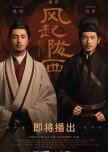
Who will spy on the spies?
The Wind Blows from Longxi is an intricate ancient spy thriller that is not for instant gratification audiences. Its biggest hurdle are the first three or four episodes that are weighed down by the introduction of too many bearded and murky characters on both sides of the Shu-Wei conflict. Clearly even Lu Yang couldn't resist romance of the Three Kingdoms lore and goes down the rabbit hole of lingering on defining events and larger than life figures of the day that are peripheral to the otherwise tight plot. Past that, the storytelling simply immerses you in the lonely, tangled, nail biting, heartbreaking, cruel and utterly thankless world of ordinary spies, ants who put themselves in harms way to pave the way for great men to be glorified by history.Recent adaptations of Mo Boyang's works have been orgies of high speed chases and thrilling action scenes that fall short on suspense and in delivering satisfying and convincing motives and twists. This is very much the opposite. The production values are movie like in quality but due to the shadowy palette, this is best enjoyed on a big screen. The camera is often very still and at times comes at avant-garde angles in low light that accentuates the clandestine nature of the interactions, of opaque motives and conveys a omnipresent sense of alone-ness, tension, ambiguity and danger. The action scenes are signature Lu Yang - impressively choreographed, blood thirsty, vicious and up close and personal in the critical moments.
This drama is set during Zhuge Liang's Northern Expeditions, a period of stalemate between Shu and Wei where neither side had a clear advantage or scored decisive victories. It is an apt setting for this kind of story because when the margins are narrow, intelligence and counter intelligence can tip the scales in either direction. The drama opens with Zhuge Liang's first (of five) Northern Expeditions, which was unsuccessful. This led to General Ma Su's decapitation for his failure to hold Jieting and Zhuge Liang's demotion. It allowed his political rival General Li Yan who advocated a Southern campaign against Wu instead of Zhuge Liang's Northern Expeditions against Wei, to gain power and influence. The Northern Expeditions took place in rather complex geographic terrain, where the timely delivery of military food provisions was challenging and made the difference between victory and defeat. That is broadly most of the historical background that is needed to understand this story. Of course Three Kingdoms buffs will be thrilled by the "drive-by" of many legendary figures on both sides of the conflict but the important characters in Ma Boyong's stories are always the little people or the ants.
The lines between fact and fiction blur as Siwencao, Shu's intelligence agency, suspects that compromised military intelligence had led to their defeat at Jieting. Siwencao hastily concludes that Chen Gong (Chen Kun), a Shu spy code name Baidi (White Emperor) under deep cover at Tianshui (a Wei stronghold) must have defected and sends Xun Xu (Bai Yu), Deputy Chief of Internal Affairs to deal with him. But Xun Xu is not convinced of Chen Gong's culpability; they are intimate friends, related by marriage. Together, they discover that the highest echelons of Siwencao has been infiltrated by Zhulong (Wax Dragon), a Wei spy. They can trust no one and go rogue with a bold ploy to lure Zhulong out into the open with Shu's crossbow design, long coveted by Wei. They are forced down separate paths that are fraught with danger, under resourced and alone with nothing but their absolute trust in and knowledge of each other. But nothing ever goes completely to plan and everyone has secrets. When the rubber meets the road, will they still have each others' back? How well can one really know someone? This also applies to Chen Gong's relationships with both Mi Chong and Guo Gang, which are as riveting and illuminating has his relationship with Xun Xu. After all, this is about two states at war with each other, there is really no good or bad or right or wrong side. All of the characters on both sides are patriots to their own cause; fascinating, layered, suspicious and disingenuous characters practiced in the art of deception. Were it not for an accident of birth, Guo Gang could well have been a Xun Xu to Chen Gong.
The role of such a cunning, duplicitous and morally ambivalent character such as Chen Gong must have been written with Chen Kun in mind. He dominates the screen in every scene and had my heart in my throat at his ability to turn around dire situations and the glimpses of his ferocious, raw pain and rage that is quickly disguised by indifference or conviviality. The wildness and the violence of his emotions when he takes revenge, where his veins literally popped out of his forehead is frighteningly intense and breathtaking. Bai Yu's Xun Xu is Chen Gong's conscience, a sincere and persistent truth seeker whose bottom line is not flexible. Xun Xu's most consequential mis-calculations are with those he loves best and his regret and unspeakable guilt and sorrow are among the most moving performances I have seen from Bai Yu. While Chen Gong and Xun Xu don't actually get that much screen time together, their screen chemistry is tangible and conveys a bond that transcends dialogue with undercurrents from their body language and their unguarded manner with one another. When Chen Gong starts to play a lone hand, Xun Xu senses it and their dynamics shift and become subtly more stilted, again showcasing the sheer virtuosity of their performances.
The most outstanding aspect of Longxi's storytelling is how masterfully the narrative builds up to the plot twists and the reveals. It is so insidious that by the time the reveals happen it is already sitting on the edges of my mind and thus seems to be organic. This is very compelling because I feel that I am part of the process, and underneath all the surrounding complexity the solutions are rather straightforward and should have been obvious. The characters are so fully actualised that their decisions are characteristic and the outcomes are inexorable. Unlike many other conspiracy heavy plots, this does not succumb to too many twists with overly convoluted or illogical outcomes.
The ending is gut wrenching and yet oddly triumphant and fitting. What is clear from the get go is that Chen Gong and Xun Xu are just expendable pawns caught in a high stakes game where they are besieged by both the enemy within and the enemy outside. As a result of serendipity and his own deviousness, Chen Gong is able for a moment, to seize control of the chess board. He plays the White Emperor's gambit, trading one life for three, empowers a righteous man and writes his own ticket home. His decisions are completely in character and in doing so, he finally articulates his own bottom line. But I won't lie, my first reaction to the ending was ".And that is why those dumb f*cks lost the war!" Because I am not sure the greater good was served. While one traitor is felled, the other villain with equally dishonourable tactics gets off largely unscathed and Siwencao remains a weapon that can be both used and abused. The age old question - "Who will spy on the spies?" remains.
While the start is dense and lacks finesse and the dialogue is on the heavy side, this is a drama that rewards the patient viewer. It is not a masterpiece, indeed many of the criticisms about accessibility and the dialogue that is heavily littered with modern phrases are more than fair. Yet I find the immersive storytelling, the suspenseful plot, the stellar acting and the unconventional camerawork immensely enjoyable. This is not something likely to enjoy mass appeal but for me, I would be surprised if I watch a better drama in 2022. I can happily give this a 9.5/10.
Cet avis était-il utile?


 52
52 185
185 8
8




















